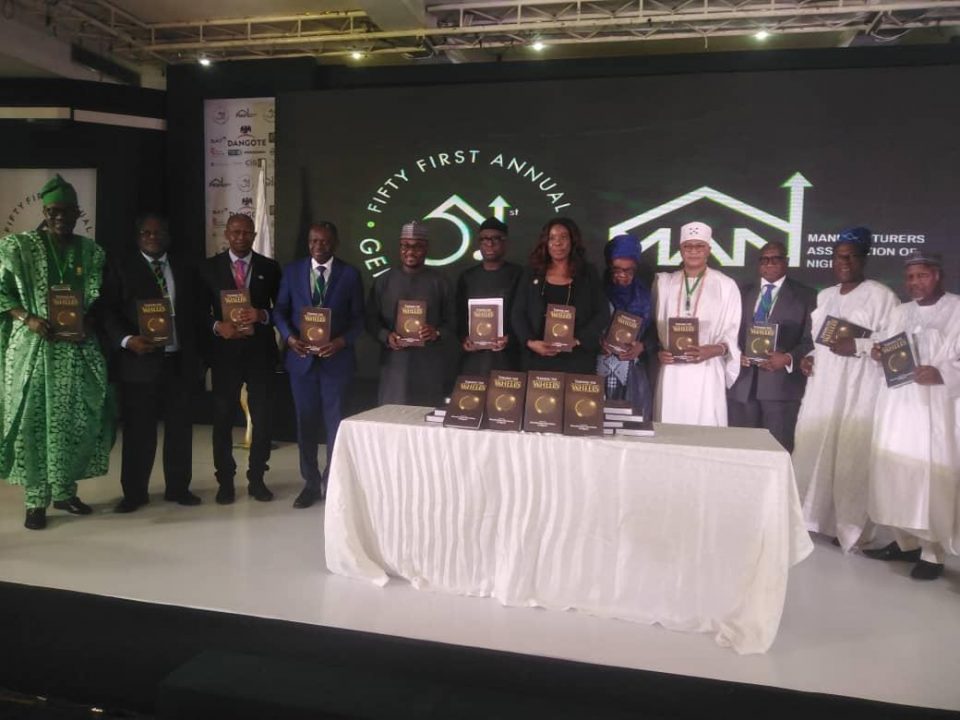By Charles Okonji
The Federal Government has stated current administration envisions industrial revitalisation and is committed to covering real aspects of industrialization from consumer credit, fiscal and monetary policy alignment and continuous engagement with the Manufacturers Association of Nigeria (MAN) as a key element in delivering presidential initiatives.
The Minister of Industry Trade and Investment, Dr Doris Uzoka-Anite, who was represented by Dr Rabiu Olowo, Director-General, Financial Reporting Council of Nigeria, during the 3rd Adeola Odutola Lecture at the 51st Annual General Meeting (AGM) of MAN, themed: “Setting the Agenda for Competitive Manufacturing under the AFCFTA: What Nigeria Needs to Do.”, stressed the need for corporate governance in manufacturing.
He expressed the readiness of the Minister of Industry to collaborate with MAN for the resuscitation of industrialization, emphasising the pivotal role of manufacturing in enhancing economic competitiveness of the country.
According to the Minister, “To harness full benefits of the AfCFTA, we must deploy strategic interventions in the manufacturing sector to enhance competitive edge, seeing the manufacturing sector is the backbone of any economy.
“To maximise the opportunities presented by the AfCFTA, they are four imperatives which are combined responsibility of government and manufacturing sector; robust public private partnership particularly in the area of research and development to enhance the strength of manufacturing, supporting Micro, Small and Medium Enterprises (MSME) with capacity and potential for exports and investment in infrastructure and technology.
“We also must enhance quality standards and performance and adhere to international quality standards.”
He maintained that Government is willing to support the establishment of research and development centres across the nation to enhance innovation and manufacturers should be encouraged to create these centres.
He called on manufacturers to promote regional value chains and industrial clusters particularly with the ongoing efforts to join the second phase of the guided trade initiative.
“Together, we can ensure that Nigeria’s manufacturing sector not only thrives but becomes a global benchmark for manufacturing, contributing to the growth of the continent and the globe.
Earlier in his welcome address, Otunba Francise Meshioye, President of MAN who decried very low growth of industrialization, stressed that Nigeria’s industrialization remains at a very low ebb.
Meshioye explained that the motivation behind the theme is the manufacturing sector’s successive undesirable and sub-optimal performance over the years and at the same time looking at the promising growth trajectory and development opportunities that are embedded in the African Continental Free Trade Agreement (AfCFTA) for industrial advancement of Africa in general and Nigeria in particular.
He said that it has become a matter of necessity and urgency to deepen “our awareness of the imperative of the AfCFTA and the need to develop the right strategies in concerted efforts to position our economy as competitive manufacturing hub of the African economy.
“There is no better time than now to raise the bar of our country by capitalizing on the opportunities presented in this historic trade agreement to advance a competitive manufacturing sector in the country.”
In his lecture, Olusegun Aganga, Former Minister, Industry Trade and Investment, noted that history has shown that Industry multiplies national wealth, creates jobs, is critical for exchange rate and balance of payment management and would make the Naira stronger.
Aganga urged the federal government to declare the Industrial sector a national priority sector and back it with plans, policies and money.
The Former Minister pointed out that embracing competitive manufacturing under the AfCFTA is crucial for Nigeria’s economic growth and integration into the global marketplace.
“Nigeria may not be able to compete with China now, but by investing in infrastructure, innovation and skilled labour, while addressing trade barriers, the business environment and promoting market access, Nigeria can certainly position itself as the manufacturing hub in Africa.
“Let us work together and seize this historic opportunity and create a prosperous and vibrant manufacturing sector that will benefit Nigerians and contribute to the economic development of the African continent as whole.”
He said a lot of weaknesses present a daunting and extremely difficult environment for any country to industrialise let alone aim to be competitive.
According to him,” Some of the weaknesses he listed were the emergence of lower cost competitors both from Africa and outside Africa; Nigeria loses its market and the opportunity to truly move from an agrarian to an industrial economy; the flooding of domestic market with cheaper and substandard products; the threat of continued de-industrialisation; Nigeria’s economy will remain very weak.
“These he said will of course lead to insecurity, increased levels of poverty, unemployment borrowing, a difficult macroeconomic environment with high inflation and exchange rates; balance of payments issues and dwindling foreign reserves.”




